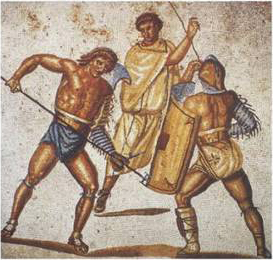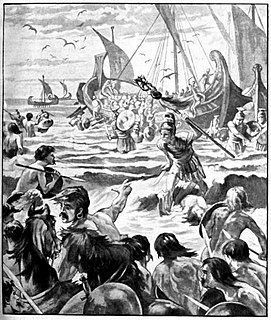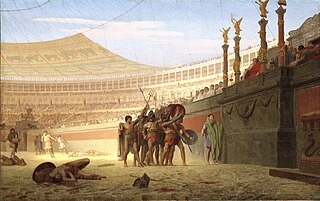Related Research Articles

Tiberius Claudius Caesar Augustus Germanicus was the fourth Roman emperor, ruling from AD 41 to 54. A member of the Julio-Claudian dynasty, Claudius was born to Drusus and Antonia Minor at Lugdunum in Roman Gaul, where his father was stationed as a military legate. He was the first Roman emperor to be born outside Italy. Nonetheless, Claudius was an Italic of Sabine origins. Because he was afflicted with a limp and slight deafness due to sickness at a young age, he was ostracized by his family and was excluded from public office until his consulship.

Gaius Caesar Augustus Germanicus, better known by his nickname Caligula, was the third Roman emperor, ruling from 37 to 41. The son of the popular Roman general Germanicus and Augustus' granddaughter Agrippina the Elder, Caligula was born into the first ruling family of the Roman Empire, conventionally known as the Julio-Claudian dynasty.

A gladiator was an armed combatant who entertained audiences in the Roman Republic and Roman Empire in violent confrontations with other gladiators, wild animals, and condemned criminals. Some gladiators were volunteers who risked their lives and their legal and social standing by appearing in the arena. Most were despised as slaves, schooled under harsh conditions, socially marginalized, and segregated even in death.

Gaius Julius Caesar was a Roman general and statesman. A member of the First Triumvirate, Caesar led the Roman armies in the Gallic Wars before defeating his political rival Pompey in a civil war, and subsequently became dictator of Rome from 49 BC until his assassination in 44 BC. He played a critical role in the events that led to the demise of the Roman Republic and the rise of the Roman Empire.

Nero Claudius Caesar Augustus Germanicus was the fifth Roman emperor and the last emperor of the Julio-Claudian dynasty, reigning from AD 54 until his suicide in 68. He was adopted by the Roman emperor Claudius at the age of 13 and succeeded him on the throne. Nero seems to have been popular with the members of his Praetorian Guard, and with lower-class commoners in Rome and the provinces, but was deeply resented by the Roman aristocracy. Most contemporary sources describe him as tyrannical, self-indulgent and debauched. After being declared a public enemy by the Roman Senate, he committed suicide aged 30.

Aulus Vitellius was Roman emperor for eight months, from 19 April to 20 December AD 69. Vitellius was proclaimed emperor following the quick succession of the previous emperors Galba and Otho, in a year of civil war known as the Year of the Four Emperors. Vitellius was the first to add the honorific cognomen Germanicus to his name instead of Caesar upon his accession. Like his direct predecessor, Otho, Vitellius attempted to rally public support to his cause by honoring and imitating Nero who remained widely popular in the empire.

The gens Petronia was a plebeian family at ancient Rome. This gens claimed an ancient lineage, as a Petronius Sabinus is mentioned in the time of Lucius Tarquinius Superbus, the last of the Roman kings, but few Petronii are mentioned in the time of the Republic. They are frequently encountered under the Empire, holding numerous consulships, and eventually obtaining the Empire itself during the brief reign of Petronius Maximus in AD 455.

A retiarius was a Roman gladiator who fought with equipment styled on that of a fisherman: a weighted net, a three-pointed trident, and a dagger (pugio). The retiarius was lightly armoured, wearing an arm guard (manica) and a shoulder guard (galerus). Typically, his clothing consisted only of a loincloth (subligaculum) held in place by a wide belt, or of a short tunic with light padding. He wore no head protection or footwear.

The gladiatrix is the female equivalent of the gladiator of ancient Rome. Like their male counterparts, gladiatrices fought each other, or wild animals, to entertain audiences at various games and festivals. Very little is known about them. They seem to have used much the same equipment as male gladiators, but were heavily outnumbered by them, and were almost certainly considered an exotic rarity by their audiences. They seem to have been introduced during the very late republic and early empire, and were officially banned as unseemly from 200 AD onwards. Their existence is known only through a few accounts written by members of Rome's elite, and a very small number of inscriptions.
Gaius Claudius Marcellus was a Consul of the Roman Republic in 49 BC.

De vita Caesarum, commonly known as The Twelve Caesars, is a set of twelve biographies of Julius Caesar and the first 11 emperors of the Roman Empire written by Gaius Suetonius Tranquillus.

In the course of his Gallic Wars, Julius Caesar invaded Britain twice: in 55 and 54 BC. On the first occasion Caesar took with him only two legions, and achieved little beyond a landing on the coast of Kent. The second invasion consisted of 628 ships, five legions and 2,000 cavalry. The force was so imposing that the Britons did not dare contest Caesar's landing in Kent, waiting instead until he began to move inland. Caesar eventually penetrated into Middlesex and crossed the Thames, forcing the British warlord Cassivellaunus to surrender as a tributary to Rome and setting up Mandubracius of the Trinovantes as client king.
A.D. (1985) is an American/Italian miniseries in six parts which adapts the narrative in the Acts of the Apostles. Considered as the third and final installment in a TV miniseries trilogy which began with Moses the Lawgiver (1974) and Franco Zeffirelli's Jesus of Nazareth (1977), it was adapted from Anthony Burgess's 1985 novel The Kingdom of the Wicked, which was itself a sequel to Burgess's book Man of Nazareth, on which was based Zeffirelli's movie. The title is the abbreviation for Anno Domini, as the events occur in the first years of the Christian Era.

No Celtic group employed a regular military as we would understand it. Organisation was according to clan grouping and social class. A war leader's immediate companions were known in Gaulish as *ambaxtoi a term which passed into Latin and from which the English ambassador ultimately derives.

Avē Imperātor, moritūrī tē salūtant is a well-known Latin phrase quoted in Suetonius, De vita Caesarum. It was reportedly used during an event in AD 52 on Lake Fucinus by naumachiarii—captives and criminals fated to die fighting during mock naval encounters—in the presence of the emperor Claudius. Suetonius reports that Claudius replied "Aut nōn".

The inaugural games were held, on the orders of the Roman Emperor Titus, to celebrate the completion in AD 80 of the Colosseum, then known as the Flavian Amphitheatre. Vespasian began construction of the amphitheatre around AD 70 and it was completed by his son Titus who became emperor following Vespasian's death in AD 79. Titus' reign began with months of disasters – including the eruption of Mount Vesuvius, a fire in Rome, and an outbreak of plague – he inaugurated the completion of the structure with lavish games that lasted for more than one hundred days, perhaps in an attempt to appease the Roman public and the gods.

Damnatio ad bestias was a form of Roman capital punishment where the condemned person was killed by wild animals, usually lions or other big cats. This form of execution, which first appeared during the Roman Republic around the 2nd century BC, had been part of a wider class of blood sports called Bestiarii.
The military campaigns of Julius Caesar constituted both the Gallic Wars and Caesar's civil war. The Gallic War mainly took place in what is now France. In 55 and 54 BC, he invaded Britain, although he made little headway. The Gallic War ended with complete Roman victory at the Battle of Alesia. This was followed by the civil war, during which time Caesar chased his rivals to Greece, decisively defeating them there. He then went to Egypt, where he defeated the Egyptian pharaoh and put Cleopatra on the throne. He then finished off his Roman opponents in Africa and Hispania. Once his campaigns were over, he served as Roman dictator until his assassination on March 15, 44 BC. These wars were critically important in the transition of the Roman Republic into the Roman Empire.
References
- ↑ Caesar, Julius. Gallic War, IV.33 and V.16.
- ↑ Grout, James. "Essedarius". Penelope at University of Chicago. Retrieved 11 January 2021.
- ↑ Petronius. Satyricon, XXXVI.
- ↑ Seneca. Epistles, Book 1 XXIX.6.
- ↑ Suetonius. Life of Caligula, XXXV.3.
- ↑ Mahoney, Anne (2001). Roman Sports and Spectacles. Focus Publishing. p. 68.